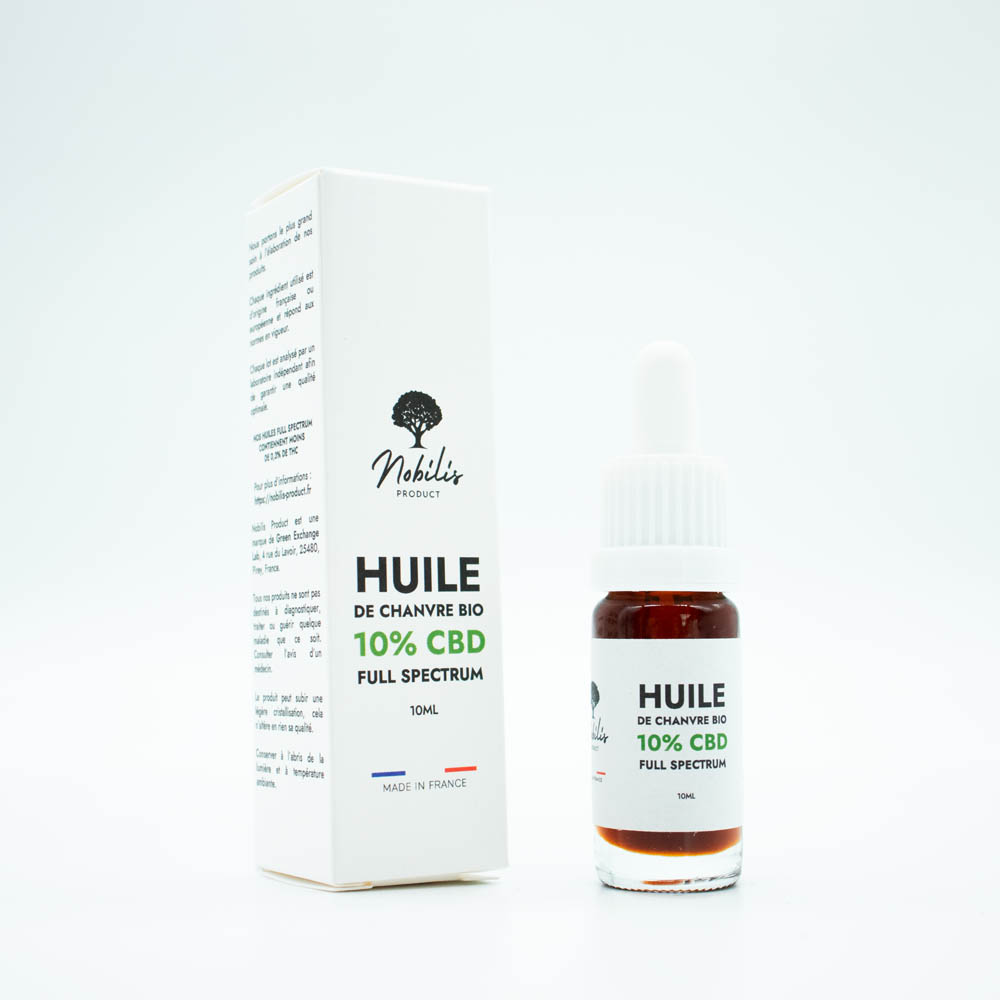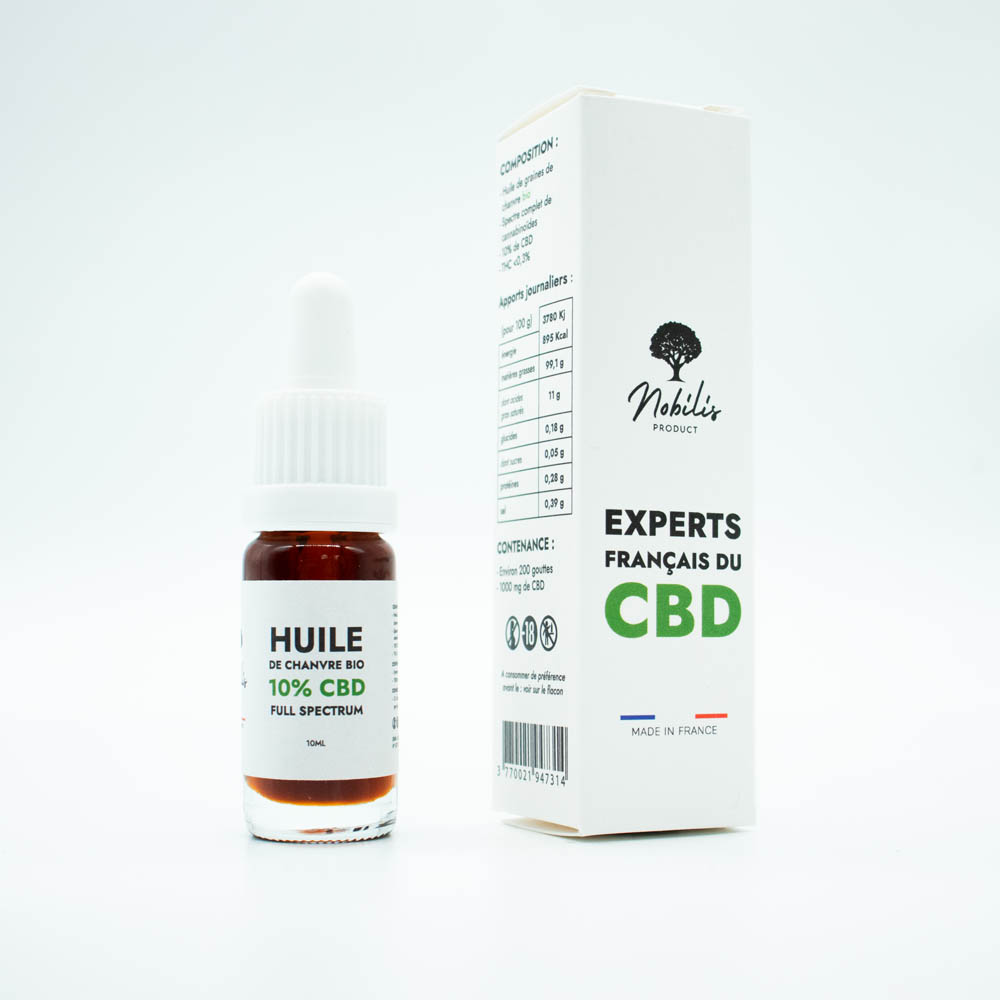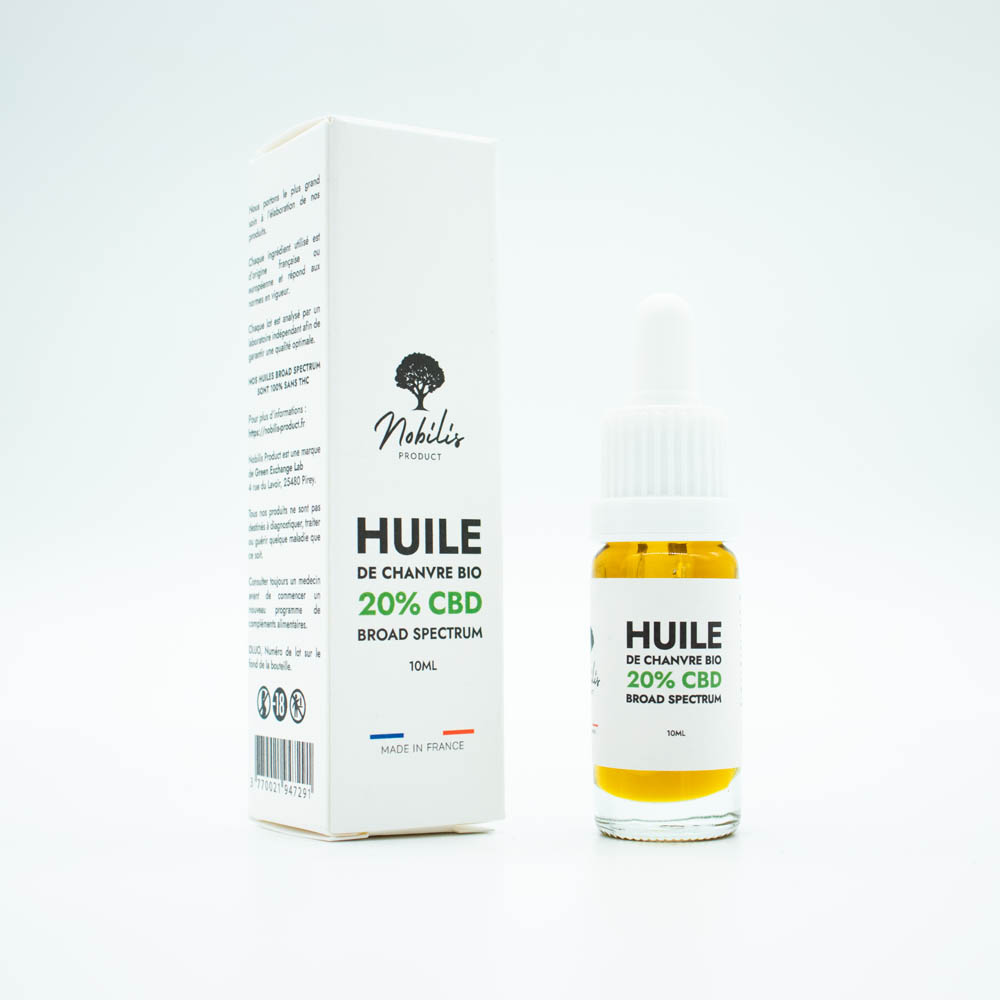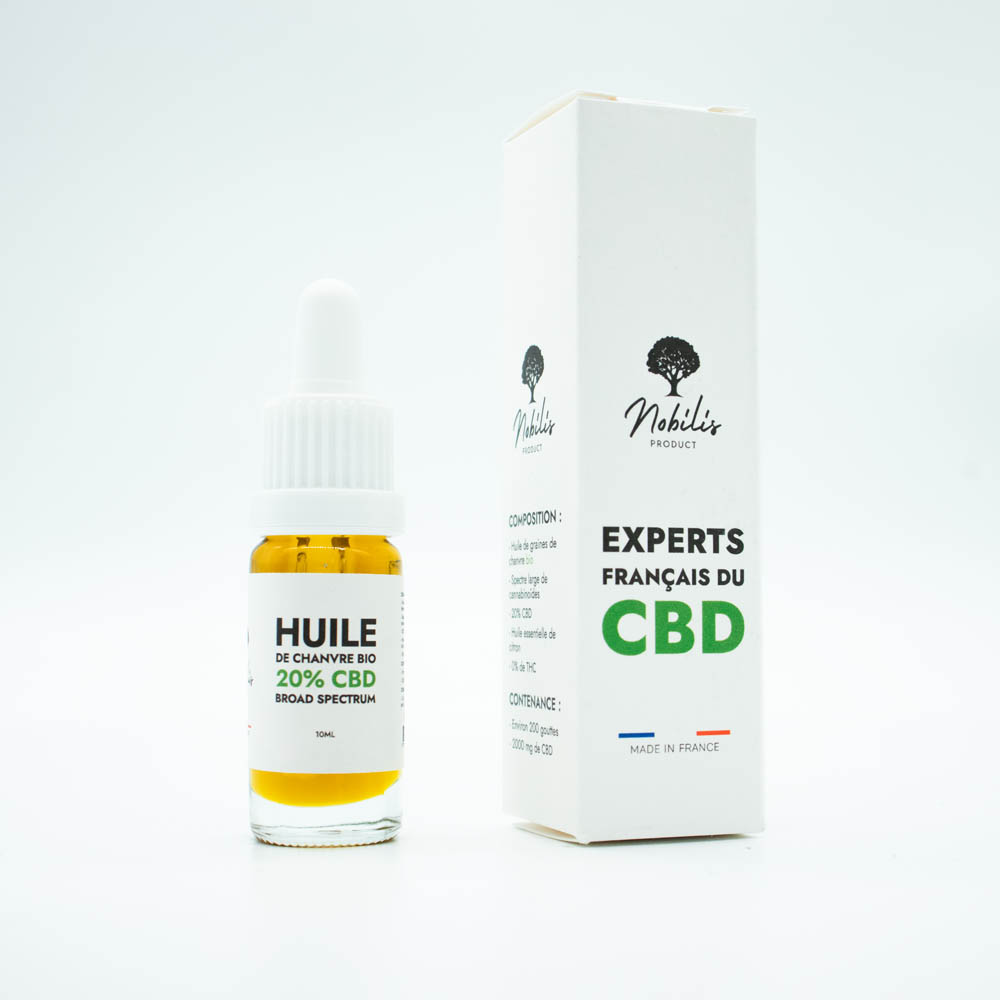Psoriasis is a benign skin disease, but it is incurable and disabling, particularly socially, as it often disrupts our relationship with ourselves and others.
Ever since the endocannabinoid system was discovered in the 90s, hemp molecules such as cannabidiol (CBD) have been attracting scientific interest in the search for treatments for many orphan diseases. These include psoriasis.
In this article, we review the main studies carried out on the effects of CBD on psoriasis.
Table of contents
Psoriasis: causes, symptoms and treatments
Psoriasis is estimated to affect between 2% and 5% of theEuropean population[1]. It usually appears between the ages of 20 and 40, but can occur at any age, even in infants.
What is psoriasis?
Psoriasis is a chronic inflammatory autoimmune dermatosis. It is characterized by the formation of thick, red, scaly patches on various parts of the body (face, back, limbs).
As an autoimmune pathology, it is explained by a disturbance in the immune system which attacks healthy skin cells, triggering an inflammatory reaction (excessive activation of T cells which release cytokines).
The exacerbated immune response then accelerates the cell renewal cycle, which in turn leads to the formation of the thick, scaly patches characteristic of psoriasis.
Under normal conditions, dermis and epidermis cells are renewed approximately every 28 days. In psoriasis, this cycle can be shortened to just a few days.
Symptoms
Although this dermatosis is always of autoimmune and inflammatory origin, its manifestation varies in intensity and severity from person to person.
However, in the vast majority of cases, psoriasis can be recognized by :
- The formation of thick red patches covered with silvery scales on various parts of the body;
- Itching and burning;
- Lesions on the scalp (scalp psoriasis);
- Spots or streaks on the nails;
- And, in some cases, joint pain (known as psoriatic arthritis).
Since psoriasis is a chronic disease, symptoms can appear in flare-ups, with periods when they diminish or disappear completely during remission phases.
What about treatments?
As we've said, psoriasis is one of those skin diseases that can't be cured. However, there are treatments that can control inflammation and improve the appearance of the skin.
These treatments include
- Creams or ointments formulated with corticosteroids (to reduce inflammation and itching), vitamin D analogues or retinoids (to slow skin cell growth);
- Light therapy (phototherapy) ;
- Drugs designed to control immune system activity (Cyclosporine) or inhibit cell growth (Methotrexate, Acitretin).
- At the same time, patients are advised to adopt a healthy lifestyle, including avoiding or learning to manage stress.
What is the link between CBD and psoriasis?
CBD and the endocannabinoid system
The endocannabinoid system is a set of receptors (CB1 and CB2) distributed throughout the body (brain, intestines, liver, pancreas, etc.) and activated by neurotransmitters (anandamide and AG-2) whose purpose is to maintain the body in a state of homeostasis (= equilibrium).
To maintain this state of equilibrium, the endocannabinoid system (ECS) regulates key physiological processes in the immune, nervous and digestive systems.
In short, the SEC plays a central role in maintaining health.
Where research into hemp compounds comes into its own is that cannabinoids (like CBD, but also THC), can bind to the CB1 and CB2 receptors of the endocannabinoid system and act, just as the neurotransmitters we naturally synthesize do, to keep the body in a state of equilibrium.
The endocannabinoid system and psoriasis
As we've already explained, our bodies are home to hundreds of endocannabinoid receptors, which are distributed throughout the body. What's more, these receptors are capable of activating/inhibiting certain key physiological mechanisms.
In the specific case of psoriasis, two aspects of the endocannabinoid system are important:
- There are endocannabinoid receptors in the epidermis, suggesting that topical application of CBD could help combat the effects of psoriasis[2] ;
- The endocannabinoid system controls, in part, the functioning of the immune system. Since psoriasis is an autoimmune disease, this suggests that CBD could also act at the source of the pathology, i.e., on the dysfunction of the immune response. Some studies have also shown that, thanks to its anti-inflammatory action [3], CBD has positive effects on acne.
Let's take a closer look at how CBD can help psoriasis sufferers.
What are the potential benefits of CBD for psoriasis-prone skin?
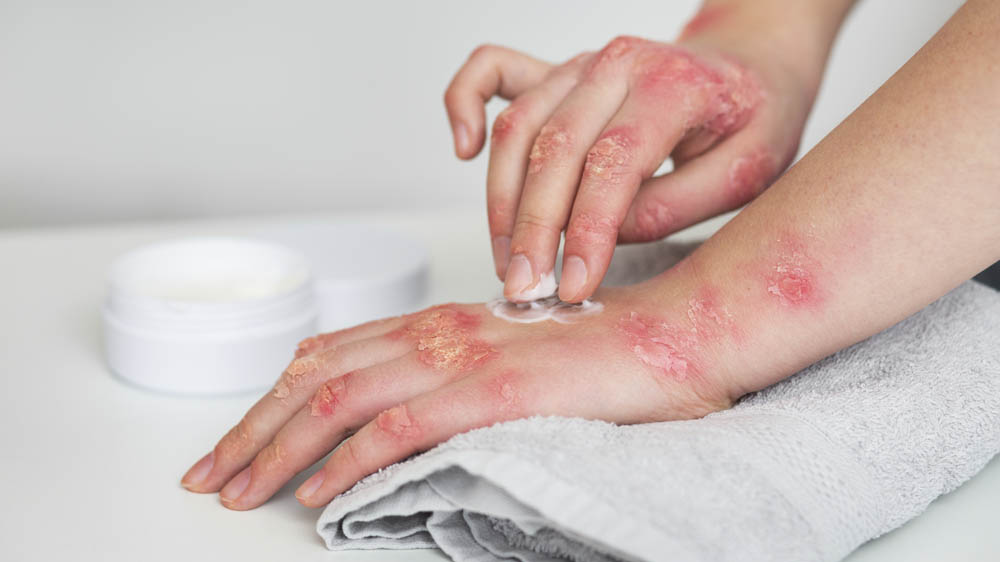
It's important to bear in mind that the studies presented below do not constitute formal proof of CBD's efficacy for psoriasis. However, as you will see, the pre-clinical results are very encouraging for the future!
Regulates skin cell proliferation
As we've seen, the immune system sends the wrong signals to skin cells, resulting in an accelerated renewal cycle. This abnormal proliferation leads to the migration of non-mature dermal cells, which accumulate in the form of red patches.
An in vitro study shows that certain cannabinoids (THC, CBD, CBG and CBN) can slow skin cell proliferation. [4]
Indeed, the researchers conclude that: "Our results show that cannabinoids inhibit keratinocyte proliferation and therefore support the potential role of cannabinoids in the treatment of psoriasis".
Anti-inflammatory properties
While psoriasis is partly characterized by epidermal hyperproliferation of keratinocytes, we mustn't lose sight of the fact that the root of the problem lies in the immune system.
Indeed, as we've explained, in psoriasis, the immune system attacks healthy skin cells, provoking an exacerbated inflammatory response.
Here again, some of CBD's properties could be useful. Indeed, its anti-inflammatory properties are now widely documented by the scientific press, particularly in the field of neurology (epilepsy, multiple sclerosis, etc.).
As for its anti-inflammatory effects on the skin, and particularly on "sick" skin, some preclinical studies show promising results, notably in the treatment of atopic dermatitis, psoriasis and contact dermatitis. [5] And, as we mentioned earlier, on acne.
However, controlled clinical trials on humans are needed to better understand the potential of these compounds and their possible side effects when applied to the skin.
Relaxing and antidepressant effects
The link between chronic stress and psoriasis is not fully understood, but many professionals agree that stress can promote, or at least exacerbate, manifestations of the disease.
As you may know, many people use CBD to combat stress and anxiety. In fact, its action on the endocrine system enables it to act on the secretion of several key hormones in the relaxation process, such as dopamine and serotonin. [6]
This action on serotonin could also help people whose psoriasis is a source of malaise, loss of confidence and depression. In fact, serotonin (aka the happiness hormone) can promote a more serene state of being and thus combat depression.
How to use CBD for psoriasis?
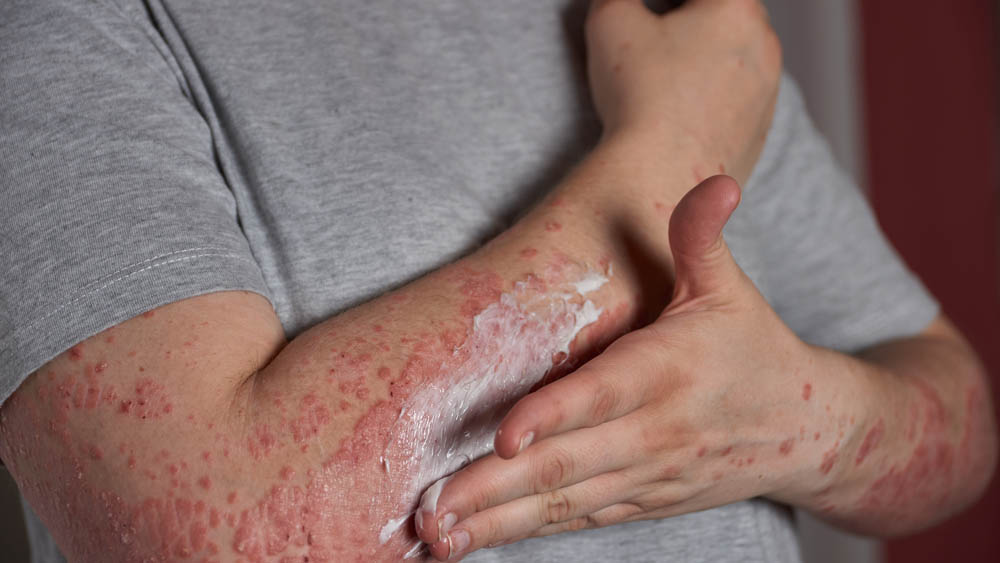
Now that you know the potential benefits of CBD on psoriasis, it's time to see how to use it.
Which CBD product to choose?
In the case of psoriasis, we recommend that you choose CBD-enriched creams and balms specially designed for this purpose. Indeed, some brands offer products whose composition combines the effects of several medicinal plants.
However, if you wish, you can also opt for a CBD oil. Preferably a full spectrum oil, as it contains all the active molecules of hemp.
In any case, make sure you choose a high-quality CBD product! Choose an organic product, to make sure it contains no potentially harmful substances that could aggravate your psoriasis.
What dosage?
If you buy a CBD cream or ointment for psoriasis, then follow the manufacturer's instructions for use.
If you wish to take CBD oil orally to benefit from its effects on the nervous system (against stress and depression), but also to rebalance the whole organism, then we recommend starting with 3 drops/day of a 10% oil.
If no improvement is observed, you can increase the dose by one or two drops a day.
-
CBD Oil 10% Full Spectrum - Nobilis Product
Rating 4.75 out of 524,90 €Discover our Full Spectrum 10% CBD oil from hemp grown in France, without additives or GMOs. Its richness in cannabinoids and terpenes guarantees an optimal surrounding effect for deep relaxation and natural well-being. Practical 10 ml bottle with pipette for precise dosage.
Our Full Spectrum 10% CBD oil is :
🇫🇷 Manufactured from A to Z (from hemp extraction to bottling) in our French laboratory.
🧪 Made with CBD crude to provide all the cannabinoids, flavonoids and terpenes.
✅ Analyzed by an independent laboratory for each batch to guarantee quality.
-
Broad Spectrum 20% CBD Oil - THC-free
Rating 5.00 out of 529,90 €Opt for our Broad Spectrum 20% CBD oil, a higher concentration for more powerful soothing and relaxing effects. Perfect for those seeking optimal relief from the natural THC-free benefits of CBD.
Our Broad Spectrum 20% CBD oil is :
🇫🇷 Manufactured from A to Z (from hemp extraction to bottling) in our French laboratory.
🧪 Made with CBD distillate to provide all the cannabinoids except THC.
✅ Analyzed by an independent laboratory for each batch to guarantee quality
Precautions for use and contraindications
Cannabidiol is considered safe up to 1500 mg/day, equivalent to a 10 ml bottle of 15% oil. However, as a precautionary measure, its consumption is not recommended for pregnant or breast-feeding women or children.
In any case, it's possible that its consumption may causemild side effects such as drowsiness, headaches and digestive disorders. In this case, stop using CBD.
When applying a CBD product topically to psoriasis-affected skin, we recommend that you seek the advice of your dermatologist to prevent any risk of allergy or drug interaction.
CBD and psoriasis: what results can I expect?
Preclinical studies on the effects of CBD on psoriasis are encouraging. Its anti-inflammatory properties, coupled with its potential effect on the skin cell proliferation cycle, can be expected to help reduce the appearance of the plaques characteristic of this dermatosis.
However, to date, there are no treatments specifically designed for CBD-based psoriasis. And the products on the market are not necessarily dermatologically tested. In addition, the efficacy of CBD depends on a number of factors, including dosage and individual sensitivity to hemp components.
In any case, if you have your dermatologist's approval, testing the effects of CBD on your psoriasis is unlikely to make the situation worse. At best, it will help reduce the appearance of red patches; at worst, it will have no noticeable effect.
Our sources
[1] WHAT IS PSORIASIS? (FrancePsoriasis.org)
[2]Therapeutic Potential of Cannabidiol (CBD) for Skin Health and Disorders (PubMed)
[3]The Anti-Inflammatory Effects of Cannabidiol (CBD) on Acne (PubMed)
[5] Cannabis-based products for the treatment of inflammatory skin diseases: a timely review (PubMed)
[6] Antidepressant-like effect induced by Cannabidiol is dependent on brain serotonin levels (PubMed)

